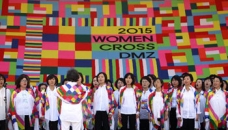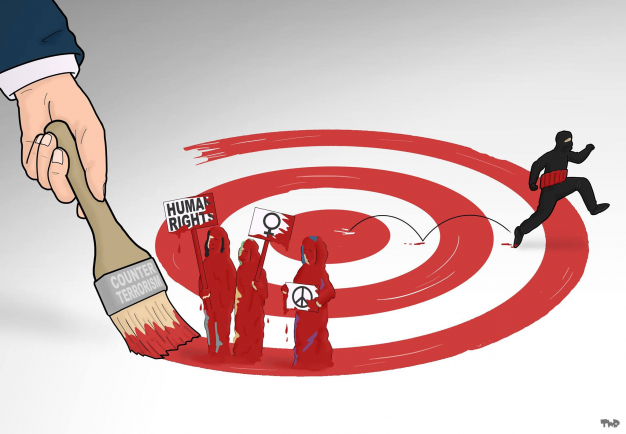Column by Netsai Mushonga
On May 24, 2015, marking the 20th anniversary of International Women's Day for Peace and Disarmament, a delegation of 30 international women peacemakers, including WPP International Advisory Council Member Netsai Mushonga, crossed the 2-mile Demilitarized Zone (DMZ) between North and South Korea as a symbolic act of peace. WPP is happy to have actively participated in this unique and courageous initiative of Women Cross DMZ. For more information on Women Cross DMZ visit their website.
As I board the plane from South Korea to return to Zimbabwe, I feel jubilant and satisfied about the active nonviolence campaign I have just participated in, the WomenCrossDMZ Peace Walk 2015. Thirty women from 15 countries crossed the DMZ on May 24, the International Women’s Day for Peace and Disarmament as a symbolic act to call for peace and reunification of Korea. We met up in Beijing and obtained visas for North Korea, we left for Pyongyang and spent four days meeting and listening to women about their experiences of war and their wish for peace and reunification as we toured the country. We participated in two peace walks in Pyongyang and Kaesong. We then crossed over into South Korea on May 24 and spent two days at a peace concert and peace symposium.
 The message from South Korean women we meet resonates with the message from North Korea since they all want peace, demilitarization and reunification of Korea. Some of the goals of the WomenCrossDMZ 2015 Campaign were to call an official end of the Korean War by replacing the 1953 Armistice Agreement with a permanent peace treaty as stipulated in Article 4 Paragraph 60. The march called for the reunification of Korean families tragically separated by an artificial, man-made division; the reduction of military tensions on the Korean peninsula; the lifting of sanction on North Korea that harm women and their families and finally we urged the leaders to redirect funds devoted to armaments toward improving people’s welfare and protecting the environment.
The message from South Korean women we meet resonates with the message from North Korea since they all want peace, demilitarization and reunification of Korea. Some of the goals of the WomenCrossDMZ 2015 Campaign were to call an official end of the Korean War by replacing the 1953 Armistice Agreement with a permanent peace treaty as stipulated in Article 4 Paragraph 60. The march called for the reunification of Korean families tragically separated by an artificial, man-made division; the reduction of military tensions on the Korean peninsula; the lifting of sanction on North Korea that harm women and their families and finally we urged the leaders to redirect funds devoted to armaments toward improving people’s welfare and protecting the environment.
I already miss the peacemakers I was with the whole week, women of great wisdom, strength and passion. I walked with two Nobel Peace laureates, Mairead Maguire of Ireland and Leymah Gbowee from Liberia. The list of women’s names reads like the ‘who is who’ in the directory of women peacemakers from around the world. These are women who have pushed boundaries, challenged leadership, mediated and negotiated for peace and human rights all over the world. Their efforts have led to national stability and increased security for women and their communities. We all realize that peace and security are prerequisites for development in any country or region. We were a group of 30 women with cut-edge wisdom and insights, fearless, innovative and in possession of skills for deep analysis of situations to seek active nonviolent solutions.
Leaving Beijing to go to North Korea marked the start of our special mission. During the five days we stayed in North Korea, our program was packed with official visits, amongst others to a kindergarten, and a hospital. From these visits I got the impression that there is general feeling of deep insecurity in the country, related to the prolonged conflict with South Korea. Multiple times my heart sinks upon hearing and seeing the effects of increased militarization in the region. In my view, weapons of mass destruction do not offer security to anyone, especially not women.
At the peace symposium in North Korea, we had the opportunity to meet and hear the war stories of women. They told stories of the loss of many family members and friends – men, women, girls and boys - and the scars of the war they carry with them all their lives. Their experiences illustrate the great sorrow war causes and the urgency to create peace on the Korean peninsula. These women feel the effects of the war tensions directly: the constant state of war and the economic sanctions on North Korea take their toll on them. They strongly desire peace more than anything else, given that the current situation is just similar to war. Women want freedom, peace, stability and harmony.
The world is far from understanding active nonviolence as an approach to overcoming violence, injustice, and resolving conflicts of all kinds without creating further violence. But on May 24, with 2,000 women walking with us in North Korea and 2,000 women in South Korea for over 3,6 km, there were more than one million steps drumming for the support for peace.
Looking back at the events of May 24, I am filled with appreciation and excitement, given the strong, nonviolent message that we shared with our Korean sisters. On North Korean side, about 5,000 women, dressed in colorful traditional attire, marched with us for about a kilometer. After the march we said goodbye to the women, hopped onto the buses and drove to Panmunjom, where the armistice agreement was signed by the United States, on behalf of the United Nations Command representing South Korea, North Korea and China. In the building, we unfolded our WomenCrossDMZ 2015 quilt and sang our peace song. It was an emotional experience for all of us; we were standing in the room where adversaries decided to end a war 63 years ago, but then neglected signing a peace treaty to end hostilities.
At the DMZ crossing, I urged Korean women to reach out to one another at every opportunity they can get and cross the DMZ physically or symbolically. They can use May 24, International Women’s Day for Peace and Disarmament, as well as March 8, International Women’s Day, for this and strategize for peace in their region. My three delegation colleagues read our declaration, emphasizing the need to sign a peace agreement for the Korean peninsula.
 Upon arriving in South Korea, our hosts were really excited and looked jubilant. We walked along the DMZ on the South Korean side for about 2 kilometers, along a very high fence. At the concluding peace festival, and the peace symposium a day later, the messages spoke to the need for peace and disarmament in the Korean peninsula and the struggle for peace at all levels. They also affirmed women’s roles in peacebuilding and pointed out that UNSCR 1325 seeks to ensure the equal participation of women in governance and peacebuilding as well as their protection from war and violence.
Upon arriving in South Korea, our hosts were really excited and looked jubilant. We walked along the DMZ on the South Korean side for about 2 kilometers, along a very high fence. At the concluding peace festival, and the peace symposium a day later, the messages spoke to the need for peace and disarmament in the Korean peninsula and the struggle for peace at all levels. They also affirmed women’s roles in peacebuilding and pointed out that UNSCR 1325 seeks to ensure the equal participation of women in governance and peacebuilding as well as their protection from war and violence.
There is deep suspicion of our WomenCrossDMZ 2015 Peace Walk and some journalists who do not understand our campaign choose to call us “naïve and clueless”. Throughout the events, both in North Korea as in South Korea, I become more wary of my own words and responses that I give. This is not without cause, the international delegation first-handedly experienced how responses and statements are being taking out of context, or even misquoted, by national and international media. The North Koreans tried to portray our mission as one of solidarity with the government and leadership rather than a call to demilitarization, peace and reunification. When we cross into South Korea, there are a few angry protesters who have messages that call us traitors and invite us to return to North Korea. There is a perception that we are aligned to the North Korean government and its policies. Our mission proves so politically sensitive, that from various sides the neutrality and legitimacy of our delegation and peace walk are being questioned in the media.
The world is not used to independent women who stand for their own cause rather than be aligned to any government or male leader. I immediately see patriarchy and the cultures of violence at work in judging our mission. The world usually perceives peacemakers as being powerful men who go in to negotiate, do not give in an inch, and if there is no agreement reached, they can always bomb the country to peace! Read the disasters of these tactics in Iraq, Libya, Syria and Yemen, the horrors of war are still unfolding. Extreme violence was used in all these instances and this failed to create stability, instead it has perpetuated cultures of war and violence. The world is not used to women, who go in and create relationships necessary for peacebuilding.
It’s a pity that part of the media chose to misunderstand our role as peacemakers and agents of change in Korea. Women have been great peacemakers throughout the ages but society has refused to accept their agency and excluded them from negotiating tables and government. With our walk, we helped raise awareness of the 70 year standoff between North and South Korea and the absurdity of a heavily demilitarized zone several years after the end of the cold war. Our efforts have assisted to raise the profile of tensions in the Korean peninsula, the unchecked militarization, the DMZ and we continue to support our sisters in Korea to continue crossing the DMZ physically and symbolically.
In this intensive week, I discovered the harmful linkages of war and militarization around the world. The DMZ itself has about 1 million landmines and I shudder to think how much it is going to cost to remove these in the future. I also got first-hand information on the effects of war and violence, from the North and South Koreans. The bombings, deaths, destruction of food stocks, tortures, rape and most of all the lingering fears of another attack. Both Koreas have been amassing weapons due to the threat of the unresolved 1950-1953 war and this takes away from development funds.
I really feel that crossing the DMZ is a brilliant example of peaceful resistance against the drums of war. As described in the final statement of the delegation, this is a first step to civil diplomacy, though we still have a long journey ahead of us. The action fits perfectly with WPP's mission to mobilize women all over the world to work for peace using active nonviolence. With me participating on behalf of WPP, WPP underscores the solidarity with women from all over the world living in conflict and war zones.
After our departure I am praying that women of North and South Korea are already reaching out to one another and crossing the DMZ. One of the last vestiges of the cold war should come down and the 10 million families separated for 70 years should be able to cross the border freely as is normal around the world.
Netsai Mushonga is a development, women rights, gender and peacebuilding consultant. In 2014-2015, Netsai worked as a consultant/full time employee with the Centre for Conflict Resolution in South Africa. Between 2003 and 2013 Netsai was the National Coordinator of the Women’s Coalition of Zimbabwe, the network of 72 women’s rights NGOs and individuals across Zimbabwe. She grew the network from 24 to 72 member organizations and coordinated the successful campaigns for a Domestic Violence Act and for a gender sensitive constitution. Since 2000 Netsai has facilitated gender and peacebuilding, economic empowerment and gender-based violence training for female and male leaders in government and civil society in Zimbabwe, Southern Africa, East and West Africa, the Middle East and North Africa region, Asia, Europe and the United States of America. She has a strong background in peace and conflict resolution work, having been a board member of the International Fellowship of Reconciliation (IFOR) and later the Women Peacemakers Program Africa Region. Netsai was a participatory trainer in several WPP Training of Trainer Cycles in MENA region, Latin America and Asia.
11 Dec '17 This month WPP staff interviewed Arbia Jebali and Sarah Chamekh from Free Sight Association in Tunisia about the work their organization does, how civil society space has changed over the years, which challenges they are facing now, and how civil society in Tunisia is organizing itself to overcome those challenges.
7 Nov '17 In this article, WPP staff interviewed Doron Joles of XminY Fund, an activist organization that supports social movements, action groups and changemakers fighting for a fair, democratic, sustainable and accepting world. He discusses the unique way they have chosen to hand out funds, and the challenges that go along with funding small activist organizations in the current global climate.

25 Oct '17 This Friday, the UNSCR 1325 Open Debate will take place once again, seventeen years since the adoption of landmark UN Security Council Resolution 1325 on Women, Peace and Security. In this article WPP staff reflects on the progress made for a truly transformative feminist peace agenda until now.
